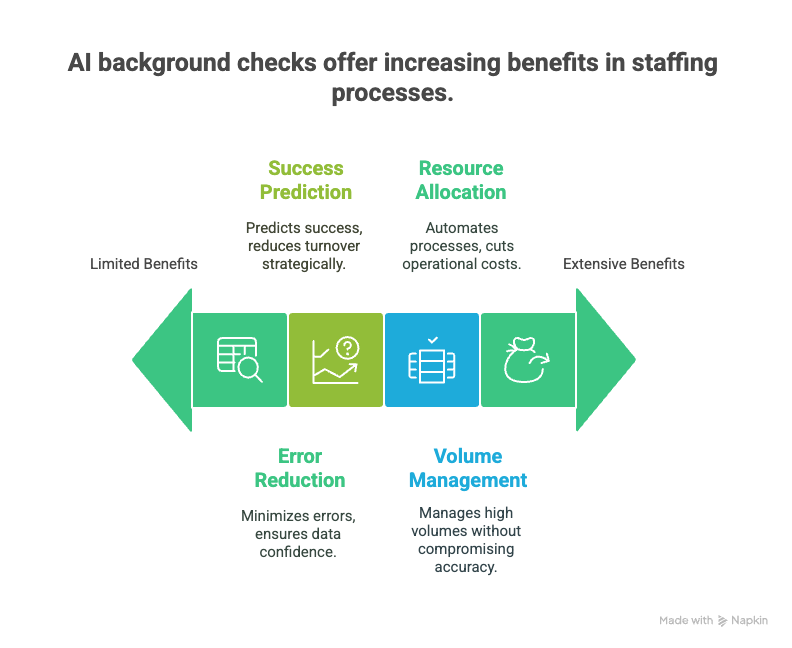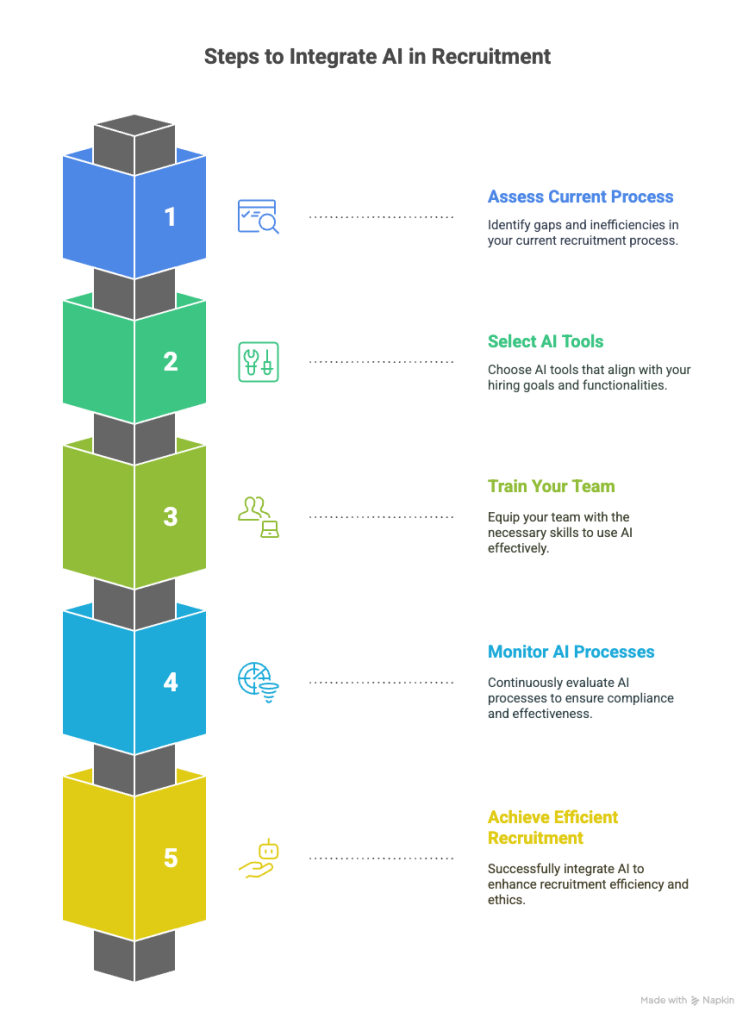AI is reshaping industries more than ever, and staffing is no exception. Particularly in the realm of background checks, AI is transforming how employers verify candidate credentials and past employment. This technology promises efficiency, accuracy, and scalability, making it a valuable tool in the hiring process. In this guide, we'll dive into the various aspects of AI in staffing background checks, covering everything from its benefits to legal considerations.
Key Takeaways
- AI dramatically reduces the time needed for background checks, moving from weeks to just minutes.
- Using AI for checks ensures greater accuracy by reducing human error and providing data-driven insights.
- While AI offers speed and efficiency, challenges like bias and data privacy concerns remain significant.
- Compliance with legal standards like FCRA and EEOC is mandatory when implementing AI in background checks.
- Future advancements in AI promise enhanced recruitment processes, but ethical considerations must guide its integration.
Introduction
Imagine reducing the time spent on background checks from weeks to minutes. That's the power AI brings to staffing. Over the last few years, AI has surged into the recruitment scene, revolutionizing how we conduct background checks. This leap offers a mix of speed, accuracy, and reduced human error.
AI in staffing isn't just a trend; it's becoming the backbone of efficient hiring processes. From sorting through mountains of data to flagging potential issues, AI reshapes how employers verify education, employment history, and other credentials.
This article delves into the intersection of AI and background checks. We'll explore the benefits, confront the challenges, and navigate the legal landscape, giving you an edge in adopting this technology in your recruitment processes.
EXPERT INSIGHT: The technology did not transform the way that we source people. Actually, it assisted in taking better care of people. What, in the past, took days to source can now take only minutes. This enables recruiters like me to speak more with candidates. Technology has made our job quicker, simpler, but we continue to care, always putting care at the center. Human touch is crucial in sourcing, and when applied well, AI enables us to care for people more consistently, on purpose. It is about speed, yes, but it is also about trusting in the better way. - Charm Paz, CHRP
Advantages of AI-Powered Background Checks
AI-powered background checks bring accuracy and reliability to the forefront. Traditional checks often suffer from human error, leading to mistakes that can undermine the hiring process. AI minimizes these errors by quickly processing and cross-verifying data, ensuring a higher level of confidence in the results.

Predictive analytics is another game-changer in staffing. AI can predict candidate success rates by analyzing past hiring data and current applicant information. This helps in not only acquiring talent that fits the role but also in reducing turnover. By making data-driven predictions, you can shift your focus from sifting through numerous applications to strategically engaging with candidates most likely to thrive.
AI's scalability transforms how background checks are conducted at scale. In a fast-paced staffing environment, handling numerous checks simultaneously can be overwhelming. AI systems manage this with ease, making them invaluable for large-scale initiatives. They can efficiently process thousands of checks without compromising on accuracy, offering a distinct advantage for firms handling high-volume recruitment.
Cost-effectiveness is another practical benefit. While there may be an initial investment in AI tools, the automation and speed they offer lead to significant savings over time. They streamline processes that would otherwise require extensive manpower and time, cutting down on operational costs. This allows you to allocate resources more effectively, gaining financial and strategic benefits in your recruitment process.
Challenges and Limitations
AI promises efficiency, but it's not without its flaws. Bias is a significant issue. AI algorithms can reflect human prejudices if not carefully managed. You've probably heard of cases where hiring AI systems favored one group over another without clear reason. This bias can seep into your hiring process, leading to unfair hiring practices.
Another challenge is the technology itself. AI systems can struggle with nuanced decisions. For instance, distinguishing between essential and non-essential job experiences might require human logic that machines don't replicate. Your hiring decisions can't rely solely on AI; human oversight remains crucial.
Data privacy is also a big concern. AI processes a massive amount of personal information. But how do you ensure that this data remains secure? Breaches can happen, and they can cost companies not just financially but also in reputation. You need to prioritize robust data security measures.
AI in staffing background checks has great potential. Still, these challenges highlight the need for a balanced approach. How do you ensure that AI enhances your hiring process without sacrificing fairness or privacy?
Legal Considerations
AI in staffing background checks must adhere to legal standards to avoid potential pitfalls. Central to this is compliance with the Fair Credit Reporting Act (FCRA). This law mandates that employers using AI tools for background checks follow procedures that protect candidates’ rights. This includes obtaining consent and providing notice. Make sure your AI systems generate reports that meet FCRA standards to avoid costly penalties.
The Equal Employment Opportunity Commission (EEOC) also has guidelines concerning AI in recruitment. These emphasize non-discrimination. AI must not create biased results. Regular audits and bias testing in your AI systems can mitigate this risk. Keep these benchmarks in check to remain compliant with EEOC directives.
Geographically, legal requirements can vary. Some states, such as California, have stricter privacy laws. Understand regional laws where your company operates. You may need tailored processes to align with local regulations, ensuring you respect each jurisdiction's mandates.
Transparency is another legal necessity. Candidates should be informed about the use of AI in their background checks. They must provide explicit consent before AI tools are applied. Clear communication minimizes legal risks and builds trust with applicants. Respect candidates' right to know what technology is used and why their data is collected. This approach not only keeps you compliant but also enhances your company's reputation.
Implementing AI in Your Recruitment Process
Finding the right AI tools for your recruitment needs starts with assessing your current process. Identify gaps and inefficiencies—areas where AI might offer improvements. Look for tools that align with your specific hiring goals and provide the functionalities you need. Read reviews, ask other professionals for suggestions, and test different options if possible.
Your team needs to be equipped to make the most of AI's potential. Training programs focused on AI technologies can bridge the knowledge gap. Having experience and comfort with these tools in your HR department ensures the technology is used effectively. Encourage ongoing learning to keep up with advancements and best practices.
AI systems are not set-and-forget. Continuous monitoring of AI processes ensures they perform as expected and stay compliant with legal standards. Regular evaluation can reveal areas for adjustment or improvement. This oversight helps maintain the effectiveness and integrity of your recruitment process.

By integrating these strategies, you can harness AI's power efficiently and ethically in your recruitment efforts.
Ethical Implications
AI in hiring raises important ethical questions. Ensuring fairness is crucial. Algorithms can unintentionally perpetuate bias present in data. You must regularly audit these systems to catch and correct bias. This way, AI can help promote diversity instead of hindering it.
Transparency in AI decisions is also essential. Candidates deserve to know how decisions affecting their careers are made. You should provide clear explanations of how AI assessments work and how they've impacted hiring choices.
Responsible use of AI requires putting ethics front and center. Implement guidelines that prioritize ethical considerations in technology deployment. It’s your responsibility to ensure AI in recruiting is wielded for equitable and just outcomes.
Future of AI in Staffing
AI's journey in staffing is just beginning. We're likely to see even more innovation as technology advances. Predictive analytics could become more sophisticated, using machine learning to anticipate hiring needs before they arise. Imagine AI not just verifying a candidate's history, but predicting their success within a company based on data patterns.
Expect tools that delve into personality assessments beyond what's on a resume. These tools might evaluate soft skills and cultural fit, elements traditionally assessed in interviews. AI's ability to analyze vast data can refine these insights and make staffing decisions more robust.
The move towards integrating AI with blockchain could redefine data security in background checks. Blockchain's immutable nature offers promise in safeguarding personal information, potentially revolutionizing how data is stored and shared.
The impact of AI on recruitment will not only be in processes but staffing structures too. As AI takes over routine tasks, HR roles may focus more on strategic planning and employee development. Ensuring technology augments human capabilities will be critical. How will AI change your staffing strategies? It's time to think about the possibilities and prepare for a future shaped by AI-driven solutions.
Conclusion
AI has significantly transformed staffing background checks. Its advantages include speed, accuracy, and scalability, enabling more efficient hiring processes. Despite these benefits, challenges such as bias, technology limitations, and data privacy issues persist. Legal compliance remains a key concern, with AI integration requiring adherence to guidelines like FCRA and EEOC. The future of AI in staffing promises continued innovation, yet underscores the need for balancing technological adoption with ethical considerations. Staying informed about AI trends ensures your recruitment practices remain effective and compliant. Consider how AI might enhance your staffing strategy today. Ultimately, technology should not replace human judgment, but strengthen it. When we use AI for good, it can assist us in hiring not just faster but also wiser and more fairly.
Frequently Asked Questions (FAQs)
Is AI legal for background checks?
Yes, AI can be used for background checks, but you must comply with privacy and employment laws. Ensure that your use of AI does not discriminate or invade privacy.
Can AI reduce bias in staffing screenings?
AI can minimize bias if properly programmed. However, biased data can lead to biased outcomes. It's essential to continually monitor and adjust algorithms for fairness.
How much do AI screening tools cost?
The cost varies depending on the complexity of the tool and the provider. Some basic tools might start in the low thousands annually, while more advanced systems could cost much more.
What are the risks of AI in background checks?
AI can perpetuate bias, make errors in judgment, or breach privacy if not carefully managed. Ensure your systems comply with laws to mitigate these risks.
How to audit AI for compliance?
Regularly review the algorithms, data sources, and outcomes for fairness and legality. Engage third-party audits and update systems based on findings to ensure compliance.
What should you look for in an AI background check provider?
Seek a provider with a strong track record in privacy, compliance, and transparency. Ensure they offer customizable and up-to-date systems.
How can you ensure AI is used ethically in hiring?
Establish clear guidelines and training for those using AI tools. Maintain oversight to ensure ethical use and fair treatment across all applications.
How do AI tools impact the candidate experience?
AI tools can speed up the process, but they might also feel impersonal. Balance efficiency with personal interaction for a positive candidate experience.
What steps can you take if AI screening results seem inaccurate?
Investigate the specific data and criteria used by the AI. Adjust the parameters or consult with experts to refine accuracy. Openly communicate with candidates about any issues.
How can you measure the success of AI background checks?
Track key performance indicators such as time-to-hire, candidate satisfaction, and accuracy of results. Regularly evaluate these metrics to assess the effectiveness of AI tools.
Definitions
Background Checks
A background check is the process of verifying a candidate’s personal, professional, and educational history. Employers use it to confirm qualifications, criminal records, identity, and sometimes credit history. AI speeds this up by scanning large databases and quickly spotting inconsistencies. For example, it can match job titles on a resume to public employment records within seconds.
Time-to-Hire
Time-to-hire measures how many days it takes from a candidate applying to their acceptance of an offer. It's a key HR metric that reflects hiring efficiency. AI shortens this time by automating repetitive tasks like resume screening or background verification. Reducing time-to-hire helps you fill positions faster and avoid productivity gaps.
Predictive Analytics
Predictive analytics uses past data to forecast future outcomes. In hiring, it evaluates which candidates are more likely to succeed in a role, based on patterns from previous hires. For instance, AI might flag that candidates with specific certifications tend to perform well in your sales department. This lets you focus your attention on high-potential applicants.
Bias
Bias in hiring refers to unfair preferences that affect decisions, often unintentionally. AI can inherit bias from the data it's trained on—for example, favoring candidates from certain schools or backgrounds. To prevent this, you need regular audits and adjustments to the algorithm. Otherwise, bias can undermine fairness and limit diversity.
Fair Credit Reporting Act (FCRA)
The FCRA is a U.S. law that outlines how employers can use background checks in hiring. You must get the applicant’s written consent and inform them if the check affects your decision. Even with AI doing the work, your process must follow the same rules. This helps protect candidates' privacy and legal rights.
References
- Federal Trade Commission Identity Theft Report (mentioned in First Capital's 2025 report): https://cfirst.io/how-2025s-background-check-trends-will-make-you-rethink-hiring/
- USA Fact's 2025 study on AI in background screening: https://usafact.com/the-impact-of-artificial-intelligence-on-background-screening-a-guide-for-business-owners/

GCheck Editorial Team
Meet the GCheck Editorial Team, your trusted source for insightful and up-to-date information in the world of employment background checks. Committed to delivering the latest trends, best practices, and industry insights, our team is dedicated to keeping you informed.
With a passion for ensuring accuracy, compliance, and efficiency in background screening, we are your go-to experts in the field. Stay tuned for our comprehensive articles, guides, and analysis, designed to empower businesses and individuals with the knowledge they need to make informed decisions.
At GCheck, we're here to guide you through the complexities of background checks, every step of the way.






